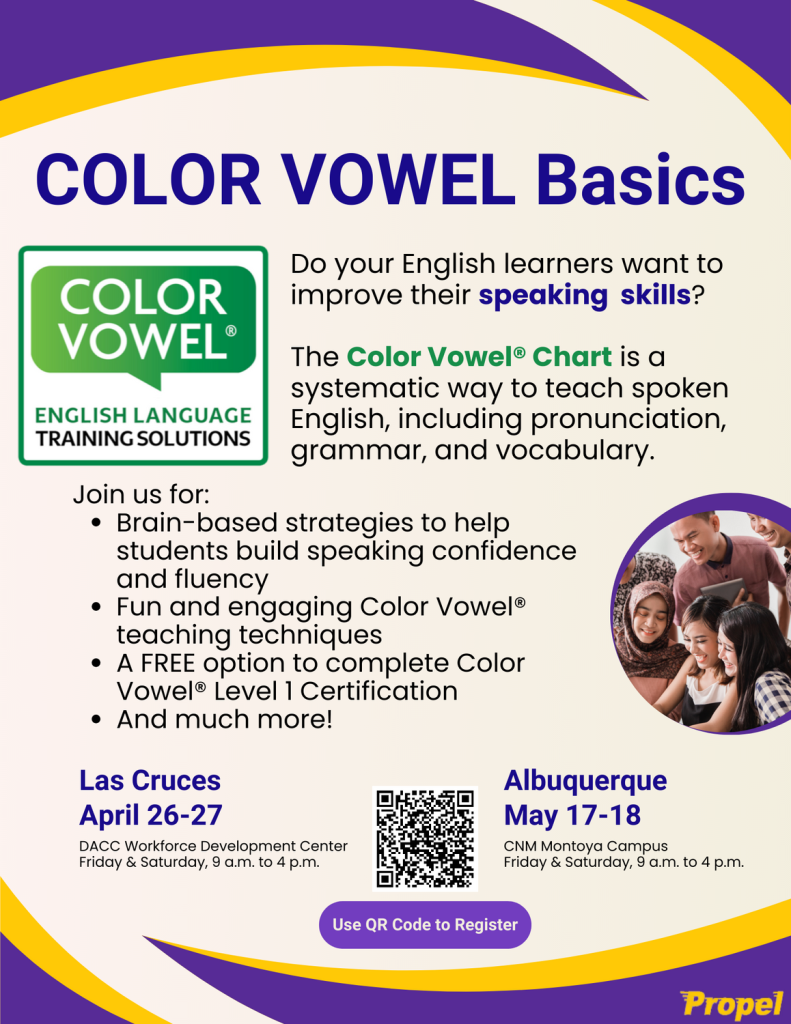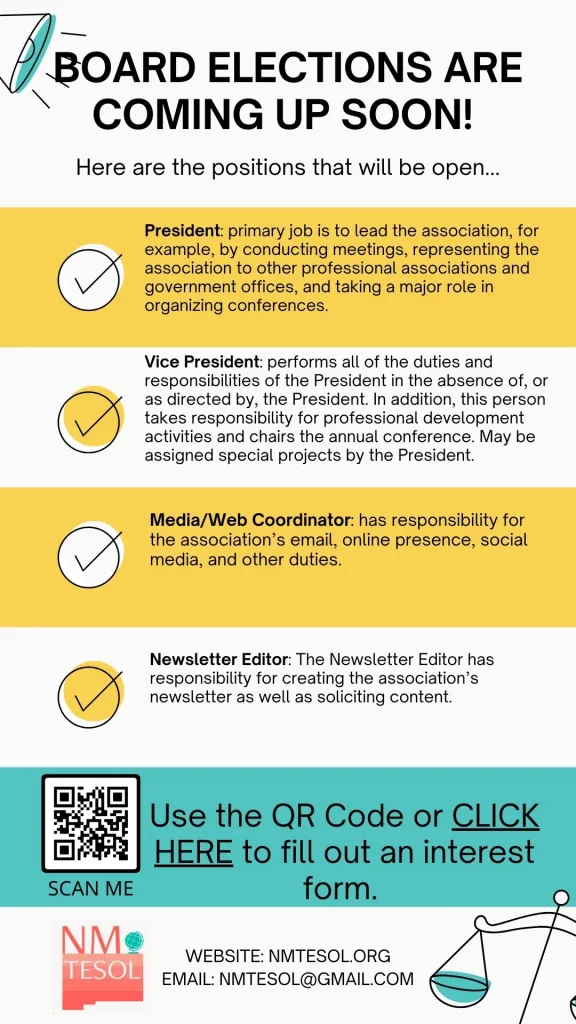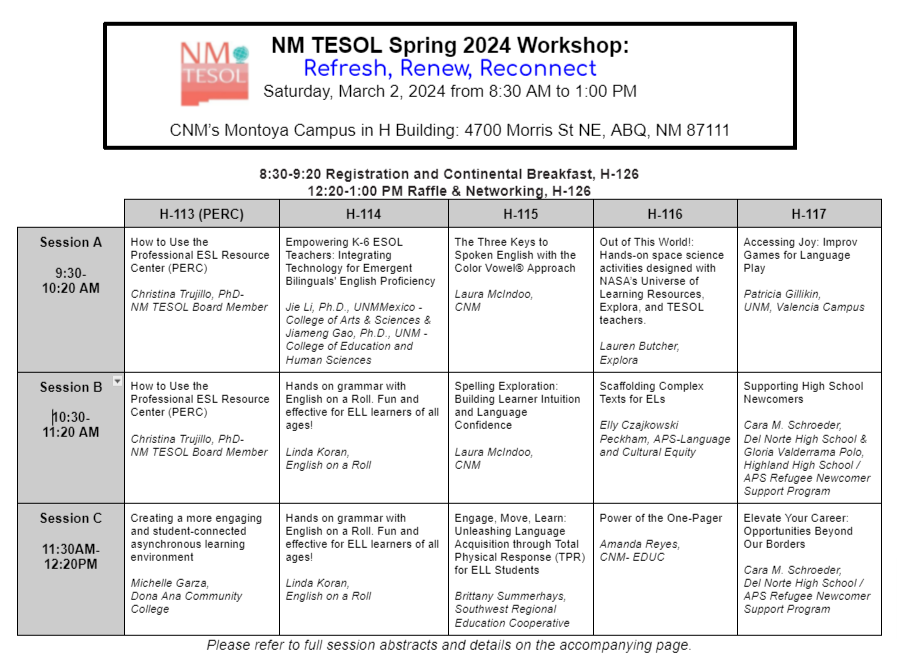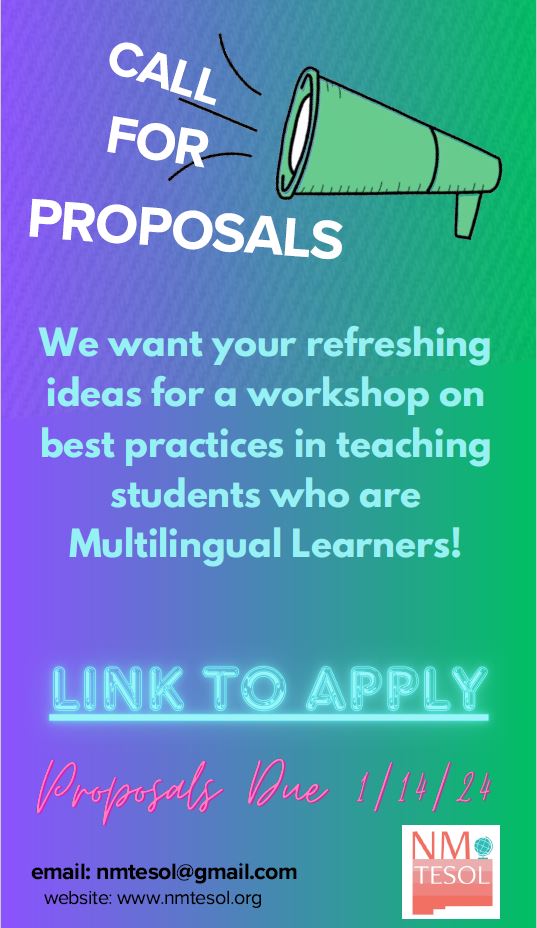For those of you who attended this wonderful session during our Spring Workshop last month, here is another opportunity to receive the full training! It is first come first serve, so register ASAP!


We will be having an informational meeting on Wednesday, March 20th from 6:00-6:30pm. CLICK HERE to fill out an interest form meeting. Please share this information with any educators you know that are passionate about supporting Multilingual Learners/English Language Learners in NM!
We are excited to see everyone on Saturday, March 2nd!

Click here to view Program and more information about each session.

Hello Everyone!
We hope you are doing well and getting ready to enjoy some well deserved rest and relaxation this holiday season. We are excited to announce our Spring Workshop happening on March 2nd at Montoya Campus at Central New Mexico Community College. The theme for this workshop is REfresh, REnew, REconnect. We want to welcome you to attend and encourage you to participate and/or present at this workshop. The registration fee is $25 and includes 1 year NMTESOL membership. Please click here to submit your proposals by January 13, 2024 .
Heraclitus wrote “there is nothing permanent except change” which helps explain why NM TESOL is experiencing a refresh. NM TESOL was reestablished in 2008, and ten years later here we are again hitting the refresh button to update our website and social media presence, our membership list, and our professional development opportunities.
Since this is a non-profit organization managed by volunteers, we are counting upon your input to help make NM TESOL a more vibrant useful resource in the educational community in New Mexico. Laura McIndoo and Amy Christensen are acting as Co-Presidents until the official election in December. They hope to be joined by three other interested New Mexican educators to fill the remaining board member roles of Secretary, Newsletter Editor, and Web Coordinator.
Please consider being someone who helps us make these changes. The board meetings are held online once a month and the job descriptions are below.
If you don’t have the time to serve as a board member, we would still value your input on how to make NM TESOL a more user-friendly organization. We will be creating a Survey Monkey poll after the New Year to solicit your ideas.
In the meantime, look for an email announcing our social media updates as well as information about our first workshop in the spring. To conclude, Andy Warhol states “they always say time changes things, but you actually have to change them yourself.” We look forward to getting your help to change and improve NM TESOL!
If you are interested in one of the following positions, please contact us at nmtesol@gmail.com.
How difficult is it for bilingual people to switch from Arabic to English?
NYU Abu Dhabi study tested bilingual students to see which parts of the brain are engaged when switching between languages, and the results could contradict previously held beliefs about ‘bilingual advantage’
Not Just for Reading Class Anymore: 5 Tips for Teaching Literacy Across Multiple Subjects
The very first year I taught middle school science, I found myself teaching more reading lessons than I had ever expected—and that didn’t change when I switched to a middle school math classroom two years later. Add in the fact that I had several English language learners in my class, and my lessons on mitochondria and tetrahedrons largely started with basic vocabulary and sentence flow instruction.
But looking back, I shouldn’t have been surprised. It’s not just the Language Arts or Reading teacher’s sole responsibility to teach literacy. In fact, teaching literacy is connected to any and every subject—and it’s only getting more necessary as the online and offline worlds become more intertwined.
Literacy Builds Life Skills as Well as Language Skills
Schoolchildren who read and write at home with their parents may build not only their academic literacy skills, but also other important life and learning skills, a recent study found.
The project, a study by researchers at the University of Washington, followed children for five years, either grades one through five or three through seven. It looked at their reading and writing activities at home, their school progress and their skills, both according to their parents’ reports and according to annual assessments.